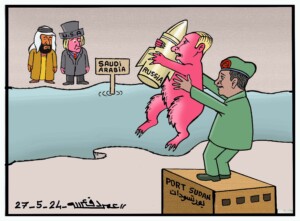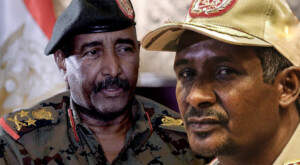Sudan’s National Dialogue ‘to be concluded in January’
The 7+7 National Dialogue Steering Committee has announced that Sudan’s National Dialogue will be concluded in January. The eastern Sudanese party, the Democratic Revolutionary Front, abandoned the National Dialogue after a physical scuffle last week.
Feisal Hassan Ibrahim, member of the 7+7 Committee, said in a press conference in the Sudanese capital on Friday that the National Dialogue will be rounded up on 10 January.
The 7+7 National Dialogue Steering Committee has announced that Sudan’s National Dialogue will be concluded in January. The eastern Sudanese party, the Democratic Revolutionary Front, abandoned the National Dialogue last week.
Feisal Hassan Ibrahim, member of the 7+7 Committee, said in a press conference in the Sudanese capital on Friday that the National Dialogue will be rounded up on 10 January.
The concept of a national dialogue was proposed by President Omar Al Bashir in January 2014 in an attempt to solve the military and economic crises in the country on a broad political basis. However, Sudan’s armed and political opposition forces boycotted the government-led National Dialogue which was officially inaugurated in Khartoum on 10 October this year.
Ibrahim called the inauguration “a new phase in Sudan’s political life that offers an opportunity to arrive at common principles leading to the advancement of the Sudanese nation and promoting its ties with the regional and international community”.
He said that several opposition members have arrived in Khartoum to participate in the meetings of the six National Dialogue committees, and expressed his conviction that leaders of the SPLM-N will soon join them.
“An agreement on a permanent constitution will be reached soon.”
The rapporteur of the National Dialogue General Secretariat, Omar Haidar, reported that 48 national figures, 80 members of political parties, and 29 members of armed groups participated in the six National Dialogue working committees so far.
“The committees have so far discussed 420 working papers and heard several lectures by academics and experts on the various Dialogue issues,” he added.
Permanent constitution
Kamal Omar, Secretary-General of the Popular Congress Party (PCP) led by Dr Hassan El Turabi, and member of the 7+7 Steering Committee, described the National Dialogue as the “true independence” of Sudan, referring to 1 January 1956 when Sudan became an independent country.
Omar announced that an agreement on a permanent constitution will be reached soon.
He regretted that the holdout parties missed the opportunity to participate in the National Dialogue. “The Dialogue will continue until it achieves the political consensus required to resolve the country’s crises.”
Democratic Revolutionary Front
According to Ali Akad, Head of the eastern Sudanese Democratic Revolutionary Front, the National Dialogue has not been conducive to solving the country’s political crises.
“This dialogue is not progressing. The ruling regime is so weak. It has no agenda, nor legitimacy.”
Akad, who is also a member of the Committee on Governance and the Implementation of the National Dialogue, said that the opposition forces should form a broader front to overthrow the ruling National Congress Party (NCP).
“This dialogue is not progressing. The ruling regime is so weak. It has no agenda, nor legitimacy,” Akad told reporters in Khartoum last week.
NCP consultations
Political analyst Salah Duma described the meetings of the National Dialogue to Radio Tamazuj as “NCP consultations, not a dialogue.
“As most opposition parties are absent from the process, the NCP members are consulting themselves. [ ..] The Dialogue, to be held between Khartoum and all opposition parties, should be mediated by a neutral body,” Duma said.
He noted that there are not even observers present at the talks.
(Sources: Sudan Tribune, Radio Tamazuj, Radio Dabanga)











 and then
and then